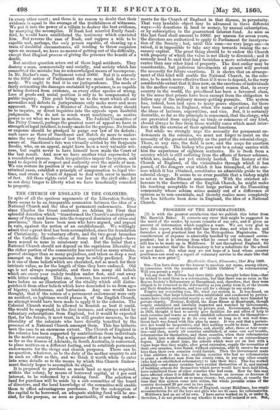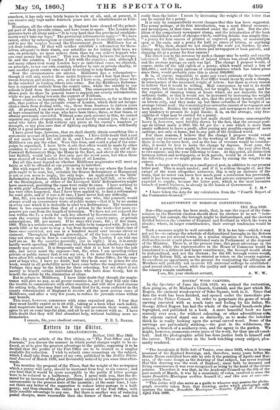PROGRESS OF THE REFORMATORIES.
[It is with the greatest satisfaction that we publish this letter from Mr. Barwick Baker. It corrects any error that might be suggested in the mind of the reader, by recent remarks of our own, and it gives an amount of information which supplies a want. We are very glad to have this report, which tells what has been done, and what to do, and furnishes a good practical hint for the Metropolitan Magistrates. The consideration of expense is admirably handled by our esteemed corres- pondent ; but it is obvious from what he cannot tell us, that the way still has to be made up in Middlesex. If not throughout England ; for let us remember that the Reformatory is but a substitute for the school ex post facto. But what may we not hope of a land whose country gentleman can send us a report of voluntary service to the state like that which we now print ?] Hardwicke Court, Gloucester, 21st May 1860. Sra—You have done me the honour to mention my name, among others in connexion with the treatment of "Little Children" in reformatories'
Will you permit a reply ? • You say that Mr. Norton had three little girls brought before him—that he wished to send them to a reformatory, but that there was no room in the Rescue Society's Reformatory at Hampstead, and, therefore, that they were obliged to be returned to the deformatory as you justly term it, of the streets and their drunken mothers, and you call for a change in our system.
Forgive my reminding you, Sir,. what our system is. It was found, on examination, that large reformatories established and conducted by govern- ments have rarely succeeded nearly so well as those which were founded by private charity. Mettray, Redhil4 the Roue Hause at Hamburgh, though largely subsidized and carefully inspected and watched by Government, were all established and managed by private zeal. Government, therefore, in 1854, thought it best to merely give facilities for and offers of help to such counties and towns as would establish reformatories for themselves— and leave each county to do its own work so long as it wia well done. Great fault was found with this plan by many. It was said that apermis- sive Act would be inoperative, and that nothing would be done. However as it happened—one or two counties, and, shortly after, three or four coun- ties—and then, nearly all counties established, at some cost and troublei reformatories for themselves, and those counties, when their reformatories got fairly into work diminished their juvenile crime to an extraordinary degree. After a short time, the schools which were set on foot with a
vague hope that they might, great extension, supply the necessities of their own counties, were found, without extension, able to receive far more boys than their own counties could furnish. Then the Government made a wise addition to the law; enabling counties who had no reformatories to grant a sufficient sum from the county rates, to pay any other county (who had an established reformatory) to take their boys. This has worked admirably—and many counties have availed themselves of it, and instead of building schools for themselves which never would have been half filled, have subsidized those of other counties who had room. How far this may have affected crime it is difficult to say, because an increase or decrease of crime may be dependent on so many causes ; but, certainly, at exactly the time that this system came into action, the whole juvenile crime of the country decreased 26 per cent in two years.
At present, I believe, the whole of England, except Middlesex, has ample accommodation for all the boys and girls who are fit cases for reformatories. Middlesex had an act of its own. I have never worked on it, or under it, therefore, I do not pretend to say whether it was well ordered or not. But,
somehow, it has only very lately begun to work at all, and, at present, it can receive only boys under fourteen years into its establishment at Felt- ham. Meantime, all the other counties in England have cleared oft' the princi- pal part of their juvenile crime, and have room to spare. The London ma- gistrates have all along said—" It is very hard that the provincial establish- ments won't take our boys." The provincial reformatories reply—" We have raised, either by subscription or county rate, money to establish our schools, and to pay the surplus beyond the Government grant. Middlesex has as yet done nothing. If they will neither establish a reformatory for them- selves, adequate to their wants, nor subsidize us for taking their boys, we can, on principle, no more relieve them than we can relieve beggars who can earn money but will not." This was the feeling between the metropo- lis and the counties. I confess I felt with the counties; and, although I and many others took many London boys as individual cases, we objected, on principle, to tax our own counties, whether by rate or private charity, to ease another great county who would do nothing to help herself.
Now the circumstances are altered. Middlesex has a reformatory— though it will only receive those under fourteen—and I fear that those be- tween fourteen and sixteen, are, so far as I have seen, precisely those who do the mischief in leading others into crime. But the Middlesex Reforma- tory is supported entirely from the county, rates, while the subsidy to our schools is paid from the consolidated fund. The consequence is, that Mid- dlesex pays its share :in general taxes to support our county reformatories, while we pay nothing towards the support of Feltham.
Some counties on learning this, have agreed to receive, so far as they are able, that portion of the juvenile crime of London, which their act incapa- citates them from dealing with, viz., those from fourteen to sixteen years old. At present, I am not aware of any accurate account as to the numbers of boys committed in the year who have been twice, three, or four times, or oftener previously convicted. Without some such account as this, we cannot organize any plan of operations, and I need hardly remind you, that a ge- neral who takes the field without any guess at the enemy's numbers or strength, or any plan save that of fighting anything that comes, will hardly fight at a good advantage.
I have great hope, however, that we shall shortly obtain something like a systematic account of London juvenile crime. I have little doubt that a cost of not much beyond 101. will do it, and I have offered to pay one-half if Middlesex can pay the other. Were this done, and could a plan of the cam- paign be organized, I have little doubt that offers would be made by other counties to receive so many boys above fourteen, as, with the aid of the Cornwall Reformatory Ship, the Home in the East, and above all the excel- lent Redhill, would take at first only just the worst cases, but when these were cleared off would suffice for the wants of all London.
But all this must depend on whether Middlesex magistrates will meet us fairly or will be offended at our presuming to interfere.
But with regard to the girls. It is not for me to say where the London girls ought to be sent, but, certainly the Rescue Reformatory at Hampstead is not as you seem to imply, the only hope. An application to the Girls' Reformatory at Exeter, which last September was not half full, or to either of the Birmingham, or either of the Liverpool Girls' Reformatories might have answered, providing the cases were really fit cases. I have nothing to do with girls' reformatories, as I find my own work quite sufficient ; but, it has very often happened, that I have been applied to, to find a reformatory for some girls, and if it was a fit ease, I have never had any difficulty. But, Sir, you must forgive my reminding one who, like yourself, would always avoid an unnecessary, waste of public money—that it is by no means in every case which it is desirable to send to a Reformatory. The treatment there is less expensive than that of a prison by the week—but more ex- pensive per case from the length of detention. We have not yet reduced the cost within the 78. a week for each boy allowed by Government. Each boy costs the country whether by Government pay, county-rates, or private subscriptions, 20/. per annum. If he stays two years, 401. ; if five years., 1001. This is a serious cost, and one not rashly to be tampered with. It is well worth 1001. or far more to stop a boy from becoming a clever thief—but of those once convicted, not one in a hundred would ever become clever or eminent. Throughout England generally, of all the boys convicted a first time not above one in four is convicted again. (In London I am told one half are so. In the counties generally,. one in eight.) If so, it is surely hardly worth spending 1001. till some trial has been made, whether a simpler remedy may succeed. It is frequently said that it is best to take the safe side, and never mind the expense—but, Sir, when I am spending either private or public money that is not my own, I do mind the expense, and I have often felt ashamed to send in my bill to the Home Office, for the sup- port of boys who, I have no doubt, had they been sent to prison for one week, would in all probability never have come before the magistrate again. Perhaps they may be the better for their schooling, but my object is not merely to benefit certain individual boys who have done wrong, but to benefit the public by the diminution of crime.
But to return to Middlesex. I have little doubt that though the magis- trates will give no pay, as all poorer counties do, yet if they will only take the trouble to communicate with other counties, and will show good reasons for asking help, they may find now, thank God for it, room sufficient in the county reformatories of England to receive all the most serious cases of Middlesex, and after a very few years, to reduce its juvenile crime within easy. bounds. This must, however, commence with some organized plan. I fear that they must hardly expect us to sit still , taking as a boon what each indivi- dual magistrate may send us ; but if they will ascertain their wants, will agree to act on some hopeful plan, and all to act in concert with us. I have little doubt that they will find abundant help, without building more re- formatories.
I remain, Sir, your obedient servant, T. B. L. BAXRIi.



























 Previous page
Previous page